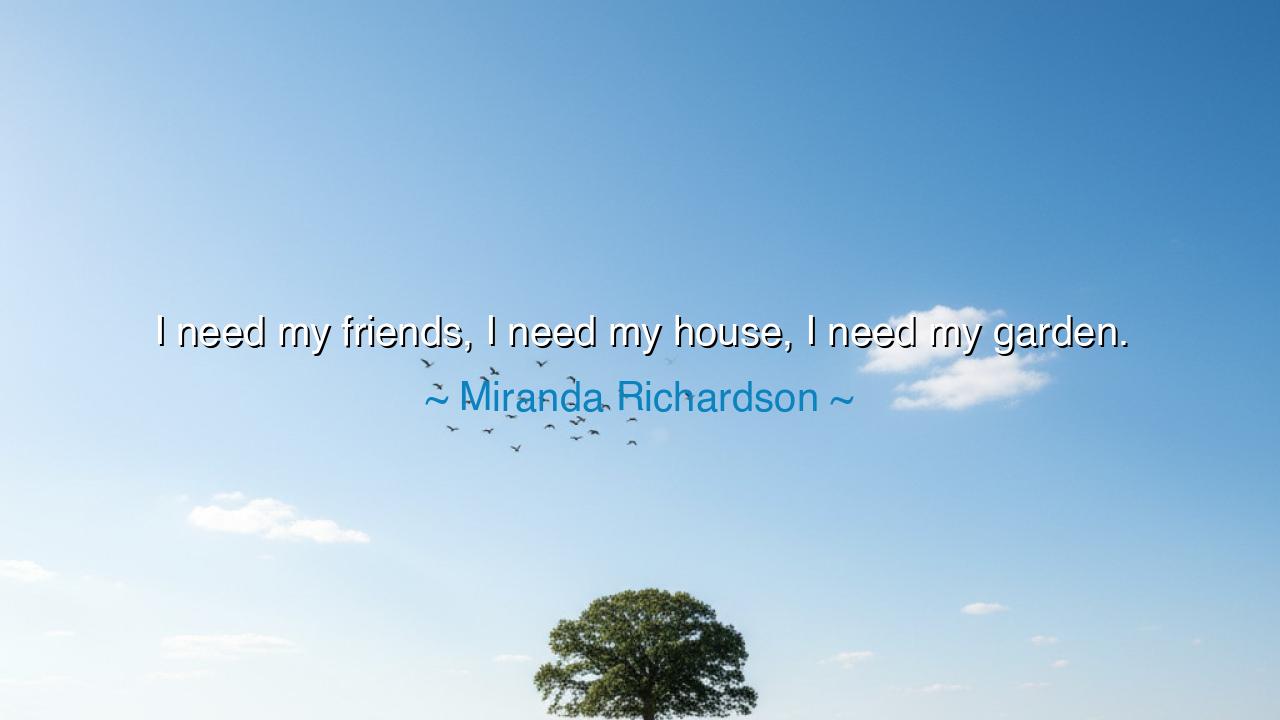
I need my friends, I need my house, I need my garden.






The words “I need my friends, I need my house, I need my garden” were spoken by Miranda Richardson, the acclaimed English actress whose performances are known for their depth, poise, and emotional truth. Yet in this quiet statement, she reveals something more intimate and universal than any role: a reflection on what sustains the soul. Beneath the simplicity of her words lies an ancient wisdom — that the human heart, though capable of soaring ambition and boundless creativity, draws its true strength from the roots of belonging. These three — friends, home, and garden — form the sacred triad of human stability: companionship, shelter, and connection with nature. Without them, even the brightest life begins to fade.
When Richardson says, “I need my friends,” she speaks of that sacred bond which has sustained humanity since the dawn of time. Friends are the mirrors of our souls, the keepers of our laughter, the witnesses of our pain. In friendship, we find not only comfort but reflection — the gentle truth that we are not alone. The ancients called friendship the “second self,” for in a true friend, one sees both companionship and conscience. The lonely heart, cut off from the warmth of fellowship, begins to wither like a plant deprived of sun. Richardson’s need for friendship is not a weakness but a declaration of strength — an acknowledgment that love shared multiplies, and that joy, when divided among friends, grows greater still.
The second pillar of her reflection, “I need my house,” speaks to the longing for sanctuary. The house, in her words, is not mere architecture of wood and stone, but the dwelling place of peace — the space where one may lay down the burdens of the outer world. To have a home is to have a center, a point of return amid life’s wandering. The great philosopher Cicero once said, “A room without books is like a body without a soul,” but equally, a life without a home is like a spirit without rest. The house, when filled with light, memory, and love, becomes the vessel of one’s identity — a quiet fortress against the chaos beyond. In every era, humanity has built not just walls, but sanctuaries — places where the spirit may heal and the heart may dream.
Then comes the third, the most poetic of her needs: “I need my garden.” In this, Richardson’s words rise from the personal into the eternal. The garden is the soul’s dialogue with creation — where human care meets divine renewal. To tend the garden is to touch the rhythm of life itself: planting, growing, pruning, waiting. The garden teaches humility, for it reminds us that growth cannot be forced; it must be nurtured with patience. It teaches gratitude, for every bloom is both a miracle and a reward. And it teaches peace, for in the quiet of soil and leaf, one hears the ancient heartbeat of the earth. To need a garden is to need a connection with the eternal cycle of life — the renewal that reminds us that beauty returns after every winter.
History gives us many souls who found their salvation in these same three needs. Consider Thomas Jefferson, the philosopher and statesman, who after the storms of politics returned to his home at Monticello. There he found solace among his books, his gardens, and his few close friends. In his letters, he wrote not of conquest, but of cultivation — of peas, apples, and the “tranquil pursuit of rural life.” He understood, as Richardson does, that greatness without grounding leads to emptiness. Even the most accomplished hearts must have soil to root in — friendship to soften them, home to steady them, and nature to renew them.
Richardson’s quote, though tender, carries a powerful message for the modern world — a world that rushes, competes, and consumes, yet forgets to nurture. Many today seek satisfaction in distant achievements, while neglecting the near and sacred: the friend who waits to be called, the home that waits to be cherished, the patch of earth that waits to be tended. Her words call us back to the center of life, to the quiet miracles that sustain joy not for a moment, but for a lifetime.
The lesson is clear: true wealth is not found in abundance, but in balance. Friends feed the heart, home shelters the soul, and the garden restores the spirit. Neglect one, and life loses harmony; nurture all, and peace will follow.
Practical actions: Call a friend today, not to speak of troubles, but to share gratitude. Keep your home as a reflection of your inner peace — not grand, but alive with warmth. Tend a garden, even if it is only a single plant, and let it remind you of patience, growth, and renewal. For as Miranda Richardson teaches us, when we are grounded in friendship, rooted in home, and in tune with the living earth, we possess all that is necessary for a life both gentle and strong — a life truly worth living.






AAdministratorAdministrator
Welcome, honored guests. Please leave a comment, we will respond soon